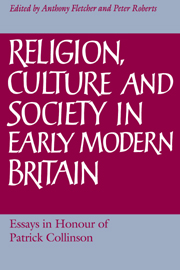Book contents
- Frontmatter
- Contents
- List of illustrations
- List of contributors
- Preface
- List of abbreviations
- Patrick Collinson
- 1 Nicolas Pithou: experience, conscience and history in the French civil wars
- 2 Elizabethan players and minstrels and the legislation of 1572 against retainers and vagabonds
- 3 Cleanliness and godliness in early modern England
- 4 Blood is their argument: men of war and soldiers in Shakespeare and others
- 5 Pragmatic readers: knowledge transactions and scholarly services in late Elizabethan England
- 6 The gardens of Sir Nicholas and Sir Francis Bacon: an enigma resolved and a mind explored
- 7 The Protestant idea of marriage in early modern England
- 8 James VI and I: furnishing the churches in his two kingdoms
- 9 A British patriarchy? Ecclesiastical imperialism under the early Stuarts
- 10 The Anglo-Scottish Union 1603–1643: a success?
- 11 Popery, purity and Providence: deciphering the New England experiment
- 12 Provincial preaching on the eve of the Civil War: some West Riding fast sermons
- 13 Popular form, Puritan content? Two Puritan appropriations of the murder pamphlet from mid-seventeenth-century London
- 14 The two ‘National Churches’ of 1691 and 1829
- Bibliography of the published writings of Patrick Collinson, 1957–1992
- Index
5 - Pragmatic readers: knowledge transactions and scholarly services in late Elizabethan England
Published online by Cambridge University Press: 03 December 2009
- Frontmatter
- Contents
- List of illustrations
- List of contributors
- Preface
- List of abbreviations
- Patrick Collinson
- 1 Nicolas Pithou: experience, conscience and history in the French civil wars
- 2 Elizabethan players and minstrels and the legislation of 1572 against retainers and vagabonds
- 3 Cleanliness and godliness in early modern England
- 4 Blood is their argument: men of war and soldiers in Shakespeare and others
- 5 Pragmatic readers: knowledge transactions and scholarly services in late Elizabethan England
- 6 The gardens of Sir Nicholas and Sir Francis Bacon: an enigma resolved and a mind explored
- 7 The Protestant idea of marriage in early modern England
- 8 James VI and I: furnishing the churches in his two kingdoms
- 9 A British patriarchy? Ecclesiastical imperialism under the early Stuarts
- 10 The Anglo-Scottish Union 1603–1643: a success?
- 11 Popery, purity and Providence: deciphering the New England experiment
- 12 Provincial preaching on the eve of the Civil War: some West Riding fast sermons
- 13 Popular form, Puritan content? Two Puritan appropriations of the murder pamphlet from mid-seventeenth-century London
- 14 The two ‘National Churches’ of 1691 and 1829
- Bibliography of the published writings of Patrick Collinson, 1957–1992
- Index
Summary
In 1595, after his Oxford studies and continental travels, Henry Wotton entered the service of the earl of Essex. Amongst the earliest tasks he undertook was an English synopsis and intellectual analysis of a Spanish work ‘the which was lately Imprinted and Written (as it is supposed) by Antonio Peres [Perez], sometimes Secretary to the King of Spain, and now residing in London’, the Pedacos de Historia (or Relaciones, as the work became known in its later editions). This ‘scholarly service’ rendered to Wotton's new master appropriately exploited his considerable intellectual talents – his fluent Spanish, his knowledge of European affairs, his training in methodical analysis. Together with his The State of Christendom, it established Wotton as the kind of scholar who could provide Essex with knowledge profitable to the enterprise of government. Pearsall Smith argues that The State of Christendom was written in 1594, and that, in the terms of the present paper, it was designed to draw Wotton to the attention of Essex, as a scholar with the kind of ‘intelligence’ which would be valuable in the service of a prominent political figure. This kind of activity, crossing as it clearly does both disciplinary and professional boundaries, and hovering between the private and the public realm, we call a ‘knowledge transaction’; the working relationship established between noble employer and his professional reader is what we call in our title, ‘scholarly service’.
- Type
- Chapter
- Information
- Religion, Culture and Society in Early Modern BritainEssays in Honour of Patrick Collinson, pp. 102 - 124Publisher: Cambridge University PressPrint publication year: 1994
- 11
- Cited by



